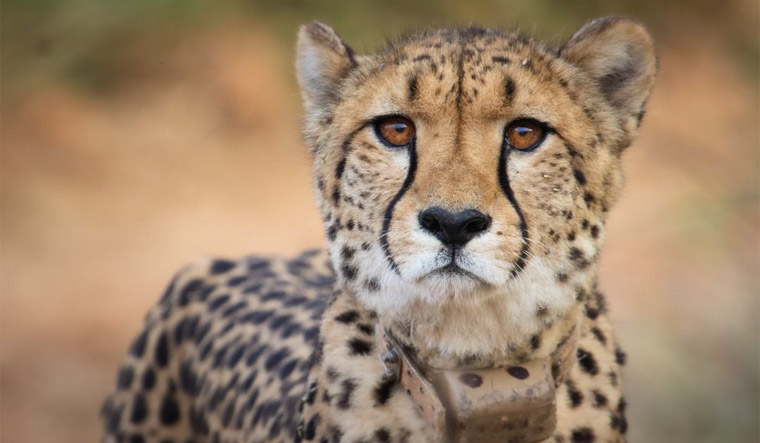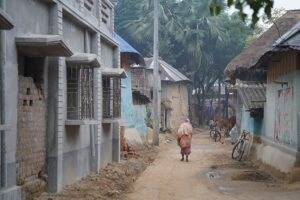Cheetah Translocation To India: An Experiment Doomed To Fail?

Cheetah Sasha was not keeping well since her arrival more than 6 months ago and died of a kidney ailment on March 27, 2023 (Image: PTI)
On Tuesday, May 9, a female cheetah named Daksha, brought to Madhya Pradesh’s Kuno National Park from South Africa, died. This was the third such death of cheetahs who have have been part of the world’s first intercontinental translocation. Out of the 20 cheetahs brought to India from Africa since last year, only 17 now remain.
Officials say Daksha was found injured by a monitoring team and was provided medical attention but she died by within a few hours. They posit that Daksha died from injuries following a violent mating attempt by two males — something not entirely unexpected from what is known about the predator’s behaviour.
On April 2, Uday, another cheetah brought to Kuno from South Africa suddenly became ill and then died. Sasha, a Namibian cheetah, died of kidney ailment complications on March 27. Officials say Sasha may have contracted the kidney ailment while in captivity in Namibia and had been unwell since arriving in Kuno.
A batch of 12 cheetahs was brought to India from South Africa and eight from Namibia last year. With the deaths of three of the big cats, it is clear that 15% of the animals have not made it past the first phase of the ambitious Project Cheetah.
There may have been varied immediate reasons for the deaths of the three cheetahs mentioned above. But the fact that stares us in the face is that they died. In short, the world’s first international translocation of cheetahs has proven to be a failure till now. A pet project of PM Modi, it has unfortunately fallen flat on its face.
One of the foremost reasons for the cheetahs’ deaths is their apparent inability to adapt to Indian conditions. This could imply both the terrain of India and its weather — which the cheetahs from South Africa and Namibia are unable to adapt to. According to conservationists, cheetahs need a large area (in excess of 1,000 sq km a year) to travel across. India has lost about 90-95% of its grasslands historically and 31% in the decade from 2005-2015. That raises the pertinent question of where the cheetahs will roam.
There is also speculation that the current batch of animals brought in from Africa lived far too long in captivity in preparation for the translocation and that may have left them stressed and vulnerable and that, in turn, may have contributed to their eventual mortality.
Since the relocation programme has been conceived as an ‘experiment’, it may be premature to pass a judgment on its failure or otherwise just yet. But what is evident is that there need to be clearly-defined criteria, along with timelines that must be adhered to, by project managers, and factor in other considerations, if they believe a course correction is warranted.
Managers of Project Cheetah underline that measures have been taken to help the cheetah flourish. These include consultation with experts in South Africa and Namibia who have actual experience in managing the species, making sure the landscape is stocked with enough prey and encourage traditions that provide incentives to local communities to protect the wildcats.
However, among many others, Valmik Thapar, an author of around 40 books on wildlife and a senior conservationist is not sure about the chances of the survival of the cheetah in the wild in India. Speaking to the website IndiaSpend, he says, “We do not have the habitat or prey species for wild, free-roaming cheetahs. The authorities have no experience or understanding of cheetahs in the wild. African cheetahs, if released into Kuno, will survive only in the short term and that too if frequently baited. India was never the natural home of African Cheetahs. They were imported, domesticated and trained to hunt. They were pets for royalty. Historically, for 300 years we have had no healthy population of cheetahs besides runaways from people’s homes. I expect nothing from this project and believe we should look after our own indigenous species and not focus money or manpower on exotic aliens.”
Another wildlife conservationist and former member of the National Wildlife Board, Prerna Singh Bindra also said that she would not classify the cheetah translocation project as a conservation project. Apropos conservation priorities, Bindra says there is only one single isolated population of the Asiatic lion, making it vulnerable to extinction and in 2018, there was a canine distemper breakout in the lion population in Gir, creating the necessity of a second home for the lions, she said. This should feature high on India’s conservation priorities.
Bindra believes India needs to save its grasslands first and stop considering them wastelands. “Our grasslands have an amazing array of charismatic and endangered species such as the Great Indian Bustard, wolves and our priority should be to conserve them,” she said while speaking to IndiaSpend.
In conclusion, although admittedly ‘glamorous’, projects like the one on cheetah translocation could be nothing more than a distraction to the core objective of wildlife conservationists, experts and policy-makers alike — conserving wildlife and ecosystems as they exist in our country as on date and avoid expensive experiments like intercontinental translocation of wild animals.





